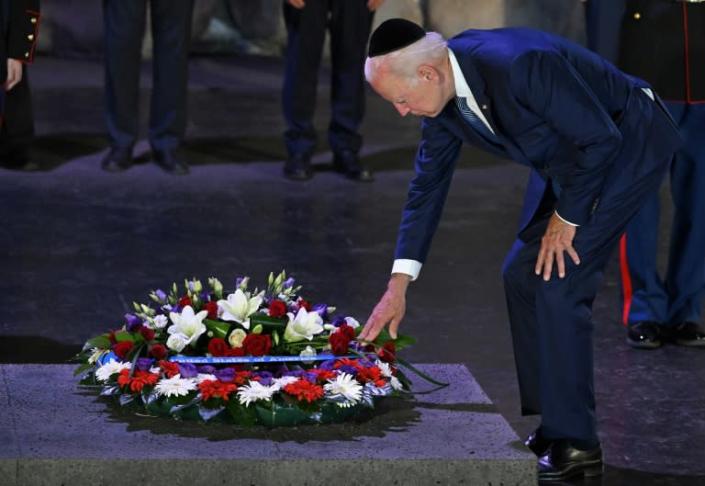
US President Joe Biden will hold bilateral talks on Thursday with Israeli officials in Jerusalem, where the two allies are expected to declare a “united stand” on common foe Iran.
Biden touched down in Tel Aviv on Wednesday for the first Middle East tour of his presidency, which will see him meet Israeli and Palestinian leaders before flying onwards to Saudi Arabia.
Tehran will top the agenda of talks slated for Thursday, according to Israeli Prime Minister Yair Lapid, while a senior official said the two leaders were due to sign a joint declaration.
The document “is going to be a living testimony to the unique quality, health, scope, depth and intimacy of the US-Israel relationship”, the Israeli official said, speaking on condition of anonymity.
“It takes a very clear and united stand against Iran, its nuclear programme and its aggression across the region,” the official added.
Israel is staunchly opposed to a nuclear deal Tehran signed with world powers in 2015 and which Biden is trying to get back on track after his predecessor Donald Trump withdrew US support.
Biden said pulling out of the landmark accord was a “gigantic mistake”.


Iran is “closer to a nuclear weapon now than they were before,” the president said in an interview aired Wednesday by Israel’s Channel 12.
Asked whether the US would use force to prevent Iran from acquiring nuclear weapons, Biden said: “If that was the last resort, yes.”
The president’s meeting with Lapid will be followed by multilateral talks on investment with India and the United Arab Emirates, which will join remotely.
– Saudi oil talks –
In addition to meeting with Israeli President Isaac Herzog, Biden will hold brief talks with Israeli opposition leader Benjamin Netanyahu.
The former premier is readying for another election campaign, with Israelis set to go to the polls for the fifth time in less than four years on November 1.


Biden is marking his tenth visit to Israel and is well-acquainted with Netanyahu.
Russia’s invasion of Ukraine will remain a top priority for the Biden administration during his regional tour, with volatile oil prices due to be the focus of talks with Saudi officials.
The president will seek to persuade Riyadh to pump more oil in order to drive down prices, which have fuelled US inflation to the highest levels in decades.


Israel has broadly stayed on the sidelines of the Ukraine war, cautious of Russia’s military presence in neighbouring Syria.
Israeli officials have condemned the conflict in broad terms but the government has refused to send weapons to the Ukrainian army.
With Israel in political limbo ahead of elections, Biden is not expected to push Lapid for significant policy changes regarding the Palestinians.
The president on Wednesday renewed Washington’s long-standing call for a two-state solution, but has not reversed Trump’s controversial decision to recognise Jerusalem as Israel’s capital.
Biden is due to meet Palestinian president Mahmud Abbas on Friday in Bethlehem, in the occupied West Bank, and pledge US financial support.
aue-rsc/lg




